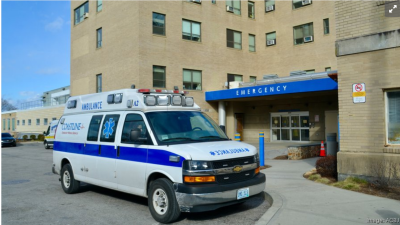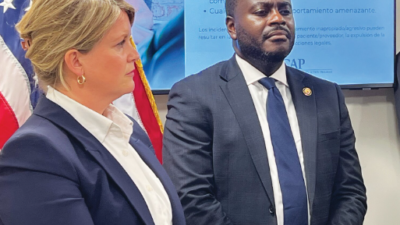
By Nancy Lavin, Rhode Island Current.
Stopping the state’s health care system from hemorrhaging is the primary focus of a revised fiscal 2026 spending budget given first passage by a panel of House lawmakers just late Tuesday night.
The $14.3 billion spending plan is roughly $500,000 less than the final fiscal 2025 budget, which after upward revisions hit the high water mark in state history. However, it’s more than the $14.2 billion proposal unveiled by Gov. Dan McKee in January.
The revised version centers largely on additional funding for health care systems and providers, along with new revenue for the cash-strapped Rhode Island Public Transit Agency and an extra $22 million to cover the recent price hike to rebuild the I-195 Washington Bridge.
“This budget was about making choices,” House Speaker K. Joseph Shekarchi said, speaking to reporters in a press briefing Tuesday night. “We weren’t going to let public transportation for the state collapse, or primary care. We had to make choices.”
On the chopping block: McKee’s workforce development and high education apprenticeship programs, alongside many of his long-term capital projects, like buying a former Citizens Bank building for state offices, closing the Department of Corrections’ minimum security facility and opening a new state-run, long-term care hospital in Burrillville.
The House Committee on Finance’s 11-3 vote Tuesday sends the updated spending proposal to the full House of Representatives for consideration on June 17. Three Republicans – House Minority Leader Mike Chippendale of Foster, George Nardone of Coventry and Sherry Roberts of West Greenwich voted against the revised budget.
Democratic Reps. Terri Cortvriend of Portsmouth and Ray Hull of Providence were absent.
Lawmakers must approve a final spending plan before the new fiscal year begins July 1.
Health care
Shekarchi repeatedly emphasized the need to address the shortage of primary care doctors, calling it both a “crisis” and a “fire” that required immediate attention.
“We can’t afford to just study it,” Shekarchi said, referring to McKee’s budget plan to study state Medicaid reimbursement rates for future increases.
To that end, lawmakers increased Medicaid reimbursement rates for primary care providers by another $45 million to match Medicare rates — following a proposal championed by Attorney General Peter Neronha. And hospitals will get another $38 million in direct state payments and rate hikes — far short of the $90 million that the Hospital Association of Rhode Island asked for, but more than McKee supplied.
Another $12 million will help struggling nursing homes, accompanied by some version of a staffing requirement.
Shekarchi emphasized that stabilizing the state’s health care landscape was a priority on both sides of the State House rotunda, referencing Senate President Valarie Lawson by name.
Lawson in an emailed statement Thursday touted the primary care investments, as well as those in the public transit agency.



